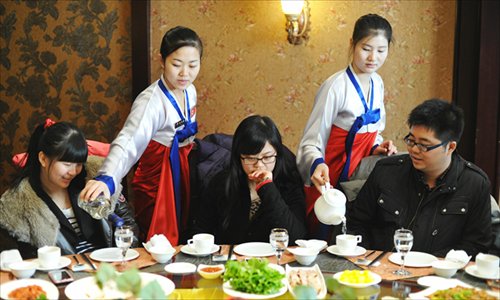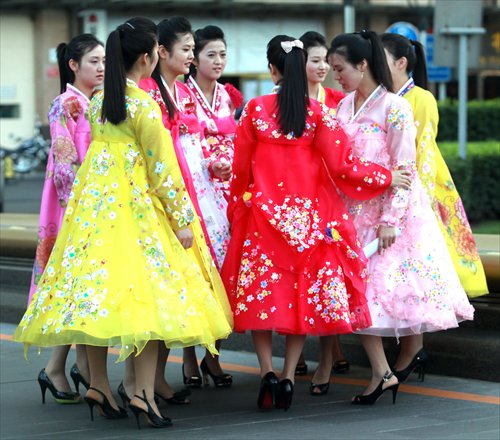Workers of fortune

North Korean waitresses serve at a restaurant in Changchun, Jilin Province on December 5, 2012. Photo: CFP

Newly hired North Korean hostesses, working at a North Korean restaurant, take an afternoon off to see their new neighborhood in Beijing. Photo: CFP
Lu En-jung, a 25-year-old North Korean dreams of leaving China and returning to Pyongyang. Three years ago, she was dispatched by her country to work as a waitress at Liujing Restaurant in Dandong, Liaoning Province, and has never gone home since.
"I haven't been home even during Spring Festival. I really want to go back and reunite with my family," 25-year-old Lu, a wide-eyed girl with a pleasant face, told the Global Times.
Before coming to China, Lu majored in hotel management in a Pyongyang college and she learnt how to play the saxophone and dance in school. However, like other North Koreans whose jobs are arranged and allocated by Pyongyang authorities, she had no idea what her future would be, until she was sent to work in China three years ago.
Lu had no idea that she was among tens of thousands of staff from North Korea dispatched to work in factories and restaurants in different cities in China.
There are no official statistics for the number of North Korean workers in China. Chosun Ilbo, a South Korean daily, reported around 120,000 North Koreans were sent to work in China last year, the highest ever yearly total, but this figure has not been verified by either Chinese or North Korean authorities.
Officials in Dandong, a bordering city of North Korea, refused to comment on the matter when approached by the Global Times.
Da Zhigang, a professor of Northeast Asia studies at the Heilongjiang Academy of Social Sciences, put the number at around 40,000.
"It is a win-win for the North to dispatch workers to China. They can bring in more foreign currency and lay some foundation for the North's economic development and reform. It also provides cheap labor for China," Da told the Global Times.
Highly-educated North Korean labors who have opened their eyes might make some influence on the country's deepening reform, Da added.
Limited scope
"When I came to China in 2009, it was very difficult. I couldn't speak any Chinese, and the climate here was so different that I couldn't get used to it," Lu told the Global Times.
Three years have gone by, Lu and other girls who came to China with her are getting used to their life here but they are far from integrating into the local community.
Like all North Korean workers in China, Lu and her compatriots, who all work as waitresses, are not allowed to leave their workplace at will. Their life is a strict routine of going from their nearby dormitory to the restaurant and back again. They have no means to act independently.
Each day, they rise at around 7 am, do some group exercises, and arrive at the restaurant before 8 am. After a short breakfast, they start a 12-hour shift from 9 am to 9 pm.
"They are in charge of welcoming guests, taking orders and delivering dishes. There are also some married women who work in our kitchen can make good kimchi," Sun, a manager at Liu Jing Restaurant, told the Global Times.
At the very beginning, Chinese classes were organized for them. "They picked up the language really fast. They could communicate with us for daily necessities after one week," Sun said.
Staff from North Korea are reputed for their hard-working nature and ability to pick up new skills. "All the waitresses are college students who have a good family background. They're versatile. They can both sing and dance. They seldom complain," Sun said.
"They believe they represent the image of their country abroad, and North Koreans work hard and diligently to honor their country."
North Korean waitresses seldom communicate with their Chinese colleagues and they are not allowed to use cell phones, Sun said.
"They are very sensitive about topics regarding their country, and sometimes, we have to kindly remind our customers not to ask such questions," Sun said.
For Lu and other North Korean waitresses, the happiest time is when they can go group shopping occasionally with the approval and supervision of North Korean officials.
"Chinese girls often wear miniskirts - too short - above the knees. We don't like it. We prefer suits," Lu told the Global Times.
Ins and outs
Each week, the girls gather to receive ideological and political education taught by their supervisor. Usually, Pyongyang sends several officials to live with overseas staff and monitor their life and behavior, as well as their ideological trends.
"Pyongyang fears its workers will witness the rapid development of China, that is in sharp contrast with their media propaganda about China, and will be so shocked that their loyalty to the motherland will waver. Therefore they choose political zealots and enhance their ideological teaching once they go overseas," stated Da.
North Korean employees are competitive compared with their Chinese counterparts. According to Chosun Ilbo, North Koreans are paid around $200 to $300 each month. It costs at least twice of the price to employ a Chinese in factories or restaurants.
An official from Dandong Foreign Trade and Economic Cooperation Bureau told the Global Times that North Koreans in Dandong are paid around $200 yuan per month on average.
But those who go overseas have to contribute a large sum of money to their government before the money reaches their hands. Previous media reports have estimated the staff have to hand over 80 percent of their salary to their government.
They work in China for a fixed term ranging from one year to three years. In return for their hard-work, "Pyongyang will arrange a good job for them when they get back, a post in the government or state-owned companies, as they made a positive contribution to their country by earning foreign exchange for North Korea," Sun told the Global Times.
The export of labor from North Korea is sensitive due to the nation's planned economy and tumultuous international ties. The number of North Korean workers outside the country, including China and Russia, fluctuates according to the situation on the Korean peninsula and changes in international politics.
"Each year in March after the Spring Festival, it becomes high season for North Koreans to come across the Yalu River and work in Dandong," Tang Chunhui, owner of a construction materials company in Dandong, told the Global Times. However, Tang said that this year had seen a decline in the number of North Koreans coming over.
In the long run, Pyongyang has plans to expand its labor exports.
Back in the late 1950s, North Korea's economy collapsed after the Korean war, and Pyongyang began dispatching workers overseas in an endeavor to pay huge debts.
How to get in
However, there are many limitations on employing North Koreans in China. In earlier times, North Koreans, were only allowed to work in the branches of North Korean companies, factories or restaurants in China. In recent years, this has expanded to include Chinese restaurants in first-tier cities, like Beijing and Shanghai. Beijing's Changnan Mansion, a high-end restaurant, has employed tens of North Korean waitresses on staff.
However, the manager of the restaurant declined to be interviewed by the Global Times, saying "it is sensitive to talk about North Korean issues and the waitresses don't like to do so."
"The approval process is not complicated, but the application requirements are harsh and take a long time to complete," Huang, an official from Dandong Foreign Trade and Economic Cooperation Bureau, told the Global Times.
North Korean workers can enter the food processing, clothing processing and software industries. The Chinese government has placed stringent quotas on the numbers of North Korean employees, who cannot occupy more than 20 percent of the total number of employees in any one firm, according to the Economic Observer.
The application processes are time-consuming. "Any company or restaurant who wants to employ North Korean workers has to submit an application to the Liaoning provincial Human Resources and Social Security Bureau, and wait months for approval. Before it reaches the bureau, many local departments have to sign off on the application," Xu, a local publicity official, told the Global Times.
Normally, the applying enterprises should first negotiate with local North Korean staffing agencies and sign contracts with them as to the numbers of North Korean employees before they submit the application, according to Economic Observer. The staffing agencies would charge some money.
Before the application can be submitted, the local public security bureau, foreign trade department, human resources bureau and foreign affairs department have to sign off on it.
"Qualified enterprises should have been based in Dandong for over a year, have more than one year of tax returns and its investment capital should reach $1 million," Xu said.
The tedious application system has scared off some of the enterprises who sought to benefit from cheap North Korean labor, Xu added.